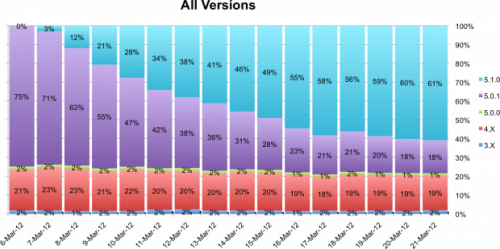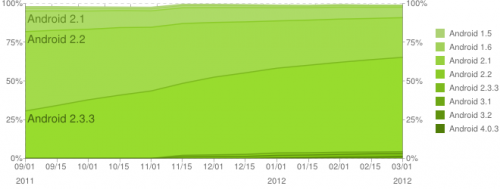They say a picture is worth a thousand words. Well, look at the picture above – it shows the iOS 5.1 adoption rate since the new version was made available on March 6th alongside the announcement of the new iPad, as compiled by developer David Smith. After two weeks … 63% of the total userbase had switched.
And that percentage includes folks who have iOS 3 limited devices like my first-gen iPod Touch (or first gen iPhone), or iOS 4 limited devices like anything before the iPhone 3GS. If you were looking just at ‘opportunities’, the percentage would be even higher!
And … here is the picture for Android over the last several months.
As of the latest data, 61.5% of Android users are using OS 2.3 Gingerbread … an OS introduced in late 2010. And over 6 months Gingerbread has climbed from ~30% to just over 60%, or about 5% share increase per month. So within two weeks iOS 5.1 has seen greater adoption than Android 2.3 in more than 18 months. Yes, I know it isn’t so simple …
Why is this comparison noteworthy? Because it shows that given the option, users will adopt the latest operating system. With iOS they are given that opportunity … but ironically with Android, the so-called ‘open’ OS, they are not. They need to wait for it to go through a labyrinthine approval process that will certainly take months if not years to happen … if it ever does.
Sure, you can hack your phone and install whatever version of Android you want, but a few thoughts on that:
– Nobody, from Google to the phone OEM to the carrier, will support your device once you do this.
– Some carriers and OEMs have implemented methods to stop you from doing this – making it clear it is NOT a standard practice.
– Some apps, even from Google, will not work if you are ‘rooted’.
I sit here with my beloved Droid 4 (seriously, the keyboard is awesome, as is the rest of the phone), wishing only that it was running Android 4.0 ICS. But I know I have at least a few more months to wait – and I am one of the lucky ones. Right now activations are estimated at 11 Gingerbread devices for every Ice Cream Sandwich device. This means that without existing devices getting updates ICS would continue to LOSE market share for a very long time … and it is barely above 1% now!
Bottom line: everyone pooh-poohed Apple’s OTA updates as me-too when they launched. Yet I cannot think of another OS adoption that even comes CLOSE to what we are seeing. And the user experience has generally been quite smooth – the biggest complaints I heard were about the inability to download because the servers were clogged. Now it seems that the Android community has something to learn from Apple about OTA and OS updates. Build it, let them have it … and they will come in droves.
Source: GBM



I don’t think the Android community has anything to learn because, ultimately, Google has little leverage with the manufacturing community compared to Apple, which owns both the OS and the hardware, and no manufacturer has anywhere near the leverage with the carrier community that Apple does.
As a result, the Android community is stuck with manufacturer and carrier created bloat which needs to be updated before the manufacturer and carrier will push an OS update. I think the Android community knows that Apple got OTAs right. There’s just little we can do about it.
Sadly I think you are right. It comes down to Google caring and from the way they treat android it just looks like they don’t.
I think that Google would love to see updates happen faster. However, they picked a model of distribution that led to rapid market share for Android, and putting the genie back in the bottle is pretty hard. They tried with the Nexus One and that didn’t change the model at all.
Google has shown a willingness to ‘bring the hammer down’ when it comes to things that impact the bottom line, to the point of destroying other companies in the process – even regarding Android. What they have NEVER done is leverage their considerable power on behalf of their customers. Never. They care? Prove it. My side is easy to prove – Android. Google +. Search Plus Your World. New Privacy Models, etc etc etc …
of course, there is no IOS device with a keyboard, or a different screen size. if you do not want a choice, go IOS.
The only issue with this is that the iOS adoption rate is the adoption rate of users of one particular app – one that I had never heard of before. It may or may not be indicative of iOS users as a whole. I know that there are a ton of iPod Touch users my son’s age and younger who do not upgrade their OS and don’t really add many productivity apps – they basically use the iPod Touch to play music and games only. Of course, the iPod Touch is very different from almost every Android app, but I also know a lot of iPhone users who use it as a phone with a few social networking apps and some games and that’s it.
My main concern with a dearth of Android updates is more that there are security updates that are being pushed out very, very late – I believe that Droid 2 Global users just got an update that disallows DigiNotar SSL certs, and that’s nearly criminal (and my old phone would likely still allow them). Nobody mentions this as an issue with late-delivered updates to Android handsets.